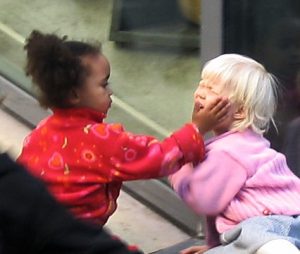1960s: Dreikurs
New World Encyclopedia; Wikimedia contributors; and Diana Lang
Rudolf Dreikurs
Rudolf Dreikurs was an American psychiatrist and educator who developed Alfred Adler’s system of individual psychology into a pragmatic method for understanding the purposes of misbehavior in children and stimulating cooperative behavior without punishment or reward. His primary focus was on pre-adolescents, and he reasoned that their problematic behavior resulted from feelings of lack of significance in their social group. He described four “mistaken goals” that such children would resort to, and outlined the most effective ways that teachers and parents could respond.[1]
He saw the family as the first social setting in which education takes place, with the school environment as an extension of the family. Thus, his techniques for preventing misbehavior and encouraging appropriate behavior could be applied equally in both settings. Dreikurs’ work continues through the training centers he and his colleagues established to train counselors in addressing the social problems of youth.
Individual Psychology
Dreikurs was often credited with “elaborating, building, and working out in a clear, systematic and logical form, the basic ideas of Individual Psychology.”[2] While most agree that his greatest contribution was in the application and practice of individual psychology, some felt he also contributed to the creation of the original theory. He is most well-known for his simplification and application of Adler’s principles for use by parents and educators. In 1964, he and Vicki Soltz wrote Children: The Challenge, and in 1968, he and Loren Grey wrote A Parent’s Guide to Child Discipline.

Adler and Dreikurs firmly believed that encouragement was essential to the improvement of behavior and human relationships. Their basic assumption was that human behavior is not predetermined by genetics, or merely the result of outside forces beyond one’s control. They argued that behavior is a result of a search for significance within a social setting. Dreikurs said “anticipation influences outcome—the fear of making a mistake leads to mistakes. Anyone who can alter the expectations of people can change their behavior.”[3] Accordingly, encouragement and positive support have a direct correlation with improved behavior in others.
Adlerian Parent Education aims to give children the skills to meet life challenges in a constructive, positive way and the courage to circumvent the many pitfalls and dangers that confront children in society. It supports parents by providing them with tools to ease and handle the stress of being a parent and to raise children with courage and compassion.
Dreikurs believed that all behavior has a purpose. He constructed what is often considered the most effective tool in helping to understand children’s behavior: The Four Goals of Misbehavior and the techniques of effectively revealing these to a misbehaving child. The development of the system of natural and logical consequences and the application of these techniques may well be Dreikurs’ finest contribution to the betterment of human society.
The Roots of Misbehavior

Dreikurs suggested that human misbehavior is the result of not having one’s basic needs of belonging to, and contributing to, a social group met. The child then resorts to one of four mistaken goals: attention, power, revenge, or avoidance of failure.
Dreikurs’ main theory dealt with the misbehavior of pre-adolescents. He reasoned that these students will “act out” based on these four, principled “mistaken goals.”[4] The first reason for their misbehavior is that they desire attention. If they do not receive the attention they crave through their actions (good or bad, e.g., doing well on a paper or throwing a tantrum), they move onto seeking power (e.g., they may refuse to complete a paper). If their power struggle is thwarted, they seek revenge. If even revenge does not achieve the desired response, they begin to feel inadequate.
His books list many ways to combat these behaviors. The first step is for teachers to identify the mistaken goal while also noting their own response to the misbehavior, and observe the students’ reactions. Second, a teacher should confront the mistaken goal by providing an explanation of it along with a discussion of the faulty logic involved. By doing so, students are given an opportunity to examine and change their behavior. Third, Dreikurs emphasized the importance of avoiding power struggles with students. One way is simply by withdrawing as an authority figure; teachers can also redirect students’ ambitions for power by having them participate in making decisions or giving directions. This is called “democratic teaching.”[5]
Dreikurs also recommended taking positive steps against revenge-seeking behavior. The teacher is instructed to set up situations where the students can exhibit talents and strengths and ultimately experience acceptance. Lastly, teachers should encourage students who display inadequacy by offering these students encouragement and support for even minimal efforts.[6] His overall goal was that students would learn to cooperate reasonably, without being penalized or rewarded, because they would feel that they are valuable contributors to the classroom.
Logical and Natural Consequences

Dreikurs described two types of consequences: logical and natural. Logical consequences refer to “reasonable results that follow behavior either desirable or non-desirable.” They typically require students to make right of what they have done wrong. For example, if students do not complete their work during class, they are required to do it for homework. In a democratic classroom, the students would know in advance the consequences of their misbehavior because as part of the classroom they helped formulate the consequences.
Natural consequences differ from logical consequences in that the results following the behavior occur naturally. For example, if a student tips his chair backward and falls, leaving him hurt or embarrassed, this would be a natural consequence, because the hurt and embarrassment alone is a sufficient consequence for his misbehavior.
Dreikurs did not consider punishment an effective method of discipline. He viewed punishment as an action taken by the teacher as an act of revenge to show the students who is in charge. He believed that punishment was humiliating and offensive to students.
Dreikurs believed in prevention, and his main focus was on constructive behavior rather than coercive discipline. He recommended that teachers have a democratic classroom and teaching style to help students gain a sense of belonging which is the genuine goal. In this manner, students would have a social interest: a condition in which students would realize themselves that it is to their advantage to contribute to the welfare of a group. Therefore, to understand children, they must be observed in a social setting and in relationship to others, to discover the reasons for their behavior.
- Children who do not feel the basic need of belonging to a social group turn to attention, power, revenge, and avoidance of failure.
- Misbehavior can be modified without punishment through implementing natural and logical consequences.
- Dreikurs focused on pre-adolescents’ reasons for their problematic behaviors and how teachers and parents can respond to it.
- Humans have a basic need for unconditional positive regard and acceptance.
- This chapter is an adaptation of Rudolf Dreikurs by contributors to the the Wikimedia Foundation and New World Encyclopedia, and is used under a CC BY SA 3.0 license. ↵
- Adler University. (n.d.). Rudolf Dreikurs. https://www.adler.edu/page/community-engagement/center-for-adlerian-practice-and-scholarship/history/rudolf-dreikurs. ↵
- Dreikurs, R. (1968). Psychology in the classroom: A manual for teachers. Harper & Row. ↵
- Dreikurs, R. (1968). Psychology in the classroom: A manual for teachers. Harper & Row. ↵
- Dreikurs, R., Grunwald, B. B., & Pepper, F. C. (1982). Maintaining sanity in the classroom. Harper Collins. ↵
- Dreikurs, R., & Cassell, P. (1999). Discipline without tears: A reassuring and practical guide to teaching your child positive behavior (2nd ed.). Plume. (Original work published 1991). ↵
A set of psychological theories developed by Alfred Adler. These theories stated that people are primarily motivated by desires to be seen as useful and powerful individuals.

